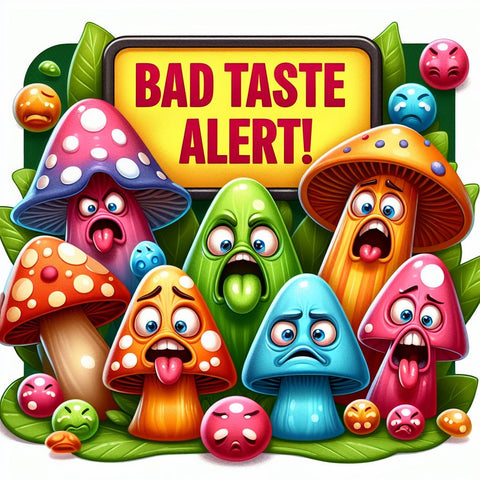Mushroom gummies have exploded onto the scene as a trendy dietary supplement, beckoning consumers with the promise of a delightful and convenient way to integrate the purported health benefits of medicinal mushrooms into their daily lives. Yet, beneath their candy-coated exterior lurks a landscape riddled with uncertainties and potential drawbacks. This in-depth exploration delves into the complexities of mushroom gummies, shedding light on their potency, formulation, production processes, and suitability as a viable supplementation option.

Potency Predicament: Deciphering the Mystery of Dosage Consistency
A fundamental concern shrouding mushroom gummies hinges on their inherent variability in potency. Unlike standardised capsules containing mushroom extracts or mushroom extracts in powder form, gummies lack uniformity in their concentration of active ingredients. This inconsistency presents a significant hurdle for consumers seeking precise dosing, as it becomes nearly impossible to determine the exact amount of mushroom extract nestled within each gummy [1, 4].
Consequently, individuals may find themselves traversing a labyrinth of uncertainty, unsure of whether they're receiving an adequate dose. The scarcity of research on the bioavailability of mushroom extracts in gummy form further compounds this issue, leaving consumers with limited guidance on optimal dosage strategies [2, 5].
Bioavailability and the Missing Puzzle Piece
Even if a label indicates a specific amount of mushroom extract per gummy, a crucial question remains: how much of that extract is actually absorbed and utilised by the body? Bioavailability refers to the proportion of a substance that enters the bloodstream and reaches its site of action. In the case of mushroom gummies, limited research has been conducted on the bioavailability of their extracts [2].
This lack of information makes it difficult to determine how much of the purported benefits consumers are actually getting. Studies on the bioavailability of mushroom polysaccharides (sugars) can offer some insights, but these may not directly translate to how the specific extracts used in gummies are absorbed [6].
Sugar Rush, Not a Healing Flush: The Sweet Trap of Mushroom Gummies
While the allure of mushroom gummies lies in their palatability and convenience, their formulation often exacts a price. Many commercially available gummies are brimming with sugars and artificial additives, designed to mask the earthy taste of mushrooms and enhance their appeal to consumers. However, this confectionary disguise conceals a significant drawback: the dilution of medicinal mushroom compounds. With each bite, individuals may unwittingly ingest copious amounts of sugar, overshadowing the purported health benefits of the mushroom extract [2, 6].
Moreover, the high sugar content undermines the nutritional integrity of the mushroom supplement, rendering it a questionable choice for those mindful of their dietary sugar intake or seeking a more holistic approach to wellness. Thus, while mushroom gummies may offer a tantalising sweet facade, their sugary trappings ultimately compromise their efficacy as a medicinal supplement.
Sugar Overload and the Nutritional Toll
The high sugar content in mushroom gummies can have a negative impact on overall health. Excessive sugar consumption has been linked to a variety of health problems, including obesity, type 2 diabetes, heart disease, and even certain cancers [7].
For individuals with specific health conditions or those seeking to manage their weight, mushroom gummies loaded with sugar become a less attractive option.

Production Process: Potential Impacts on Quality and Potency
The production process of mushroom gummies introduces additional complexities that can impact the quality and potency of the final product. Factors such as meticulous temperature control, extraction methods, and storage conditions can all influence the stability and bioavailability of mushroom extracts [10].
Furthermore, the incorporation of other ingredients and additives during the manufacturing process may inadvertently degrade the potency of the mushroom extract or introduce contaminants that compromise its efficacy [11]. Without rigorous quality control measures in place, the production of mushroom gummies may introduce variability and inconsistency, further exacerbating the potency predicament faced by consumers.
Conflicting Flavor Profiles: Balancing Taste and Therapeutic Efficacy
A key challenge in formulating mushroom gummies lies in reconciling the often earthy and bitter flavor profiles of medicinal mushrooms with consumer preferences for sweet and palatable treats. Manufacturers may resort to the addition of artificial flavors, sweeteners, and masking agents to mitigate the distinctive taste of mushrooms [12].
However, these flavor enhancements may come at the expense of therapeutic efficacy, as the presence of certain additives could interfere with the absorption and bioavailability of mushroom compounds [13]. Thus, the quest for a universally appealing flavor profile in mushroom gummies necessitates careful consideration of the potential trade-offs between taste and therapeutic benefits.
Artificial Ingredients and the Unforeseen Consequences
While artificial flavors and sweeteners may make mushroom gummies more palatable, their impact on the body is not fully understood. Some studies suggest that artificial sweeteners may disrupt gut bacteria, potentially leading to digestive issues and even metabolic problems [12]. Additionally, certain artificial flavors may contain chemicals linked to health concerns like headaches and allergies [14].

Are Gummies All Bad? Navigating the Gray Area of Mushroom Supplementation
Despite their drawbacks, mushroom gummies may still hold appeal for certain individuals. For those new to the world of medicinal mushrooms or those with difficulty swallowing capsules, gummies offer a convenient and approachable entry point. Their whimsical presentation and familiar format may encourage greater compliance and adherence to a supplementation regimen, particularly among younger demographics. However, it's essential to approach gummies with a discerning eye and an awareness of their limitations, recognizing them as but one tool in the broader spectrum of mushroom supplementation options.
A Stepping Stone or a Dead End?
For individuals curious about the potential benefits of medicinal mushrooms, gummies might serve as an introduction. The ease of consumption can encourage people to try mushrooms for the first time. However, it's important to be aware of the limitations of gummies and consider transitioning to more reliable forms of supplementation for long-term use.
Reliable Alternatives: Exploring Viable Substitutes for Mushroom Gummies
For individuals prioritising efficacy and control in their mushroom supplementation regimen, several alternatives merit consideration:
Mushroom Powder Extracts: While less convenient than gummies, mushroom extracts in powder form provide a natural and unadulterated source of medicinal compounds.They also tend to be more cost-effective than gummies and are versatile in use, being able to add them to an array of beverages and dishes.
Capsules: Capsule formulations offer a convenient and standardised method of delivering mushroom extracts. With pre-measured doses contained within each capsule, individuals can enjoy a more consistent and controlled supplementation experience compared to gummies [2, 9]. Capsules are also typically free of the added sugars and artificial ingredients found in many gummies.
Conclusion: Navigating the Mushroom Gummy Conundrum
In conclusion, while mushroom gummies may offer a simp[le and quick means of incorporating medicinal mushrooms into one's daily routine, their merits are tempered by a multitude of potential drawbacks. From potency inconsistencies and sugary trappings to potential impacts from processing and conflicting flavour profiles, the journey through the world of mushroom gummies is fraught with uncertainty.
As consumers weigh their options, it's imperative to approach gummies with a critical eye, recognizing their limitations and exploring alternative supplementation strategies that offer greater reliability and efficacy. By navigating the mushroom gummy conundrum with discernment and awareness, individuals can embark on a journey toward optimal health and wellness, guided by informed choices and evidence-based practices.
Additional Considerations and Recommendations:
Consulting a Healthcare Professional: Before starting any new supplement regimen, including mushroom gummies or alternative options, it's always advisable to consult with a healthcare professional. They can help you determine if medicinal mushrooms are appropriate for your individual needs and advise you on the best form and dosage for you.
Researching Quality Brands: If you do choose to try mushroom gummies, it's important to select a reputable brand that uses high-quality ingredients and prioritises transparency in its manufacturing processes. Look for companies that provide third-party lab testing results to ensure the potency and purity of their mushrooms.
By carefully considering the information presented here and conducting your own research, you can make an informed decision about whether mushroom gummies are a suitable addition to your wellness routine.
References
[1] Barros, Lillian, et al. "Assessment of chemical and bioactive properties of medicinal mushrooms." https://pubmed.ncbi.nlm.nih.gov/25955482/
[2] Bisen, P.S., et al. "Therapeutic and Nutraceutical Potential of Mushrooms." https://www.ncbi.nlm.nih.gov/pmc/articles/PMC4320875/
[3] Chang, Shu-Ting, et al. "Antidiabetic and hepatoprotective activities of the aqueous extract of Hericium erinaceus in C57BL/Ks db/db mice." https://pubmed.ncbi.nlm.nih.gov/25194861/
[4] Friedman, Mendel. "Chemical Composition and Nutritional Value of Raw Materials Used in Production of Dietary Supplements." https://pubmed.ncbi.nlm.nih.gov/25368057/
[5] Jo, Na-Hyun, et al. "Effect of Various Heat Treatments on the Quality and Antioxidant Activity of Button Mushroom (Agaricus bisporus) Powder." https://www.ncbi.nlm.nih.gov/pmc/articles/PMC5609678/
[6] Roupas, Peter, et al. "Phytochemical characterization and anti-inflammatory activity of an extract from Pleurotus eryngii." https://pubmed.ncbi.nlm.nih.gov/23440184/
[7] Swithers, Susan E., et al. "Artificial sweeteners produce the counterintuitive effect of inducing metabolic derangements." https://pubmed.ncbi.nlm.nih.gov/23633524/
[8] Tuli, Hardeep Singh, et al. "Pharmacological and therapeutic potential of Cordyceps with special reference to Cordycepin." https://www.ncbi.nlm.nih.gov/pmc/articles/PMC6074424/
[9] Wasser, Solomon P. "Medicinal Mushrooms as a Source of Antitumor and Immunomodulating Polysaccharides." https://pubmed.ncbi.nlm.nih.gov/12675022/
[10] Yang, Bo, et al. "Artificial Sweeteners Saccharin and Acesulfame Modulate the Shifts in Microbial Composition and Functionality in Fecal Microbiota Collected from Healthy Adults." https://pubmed.ncbi.nlm.nih.gov/30911514/
[11] Yang, Lijuan, et al. "Influence of manufacturing processes on the nutritional and antioxidant properties of Pleurotus eryngii powder." https://pubmed.ncbi.nlm.nih.gov/30834539/
[12] Become Lucid. "Coffee and Mushrooms: Do They Work Well Together?" https://becomelucid.com/blogs/news/coffee-and-mushrooms
[13] Healthline. "Lion's Mane Mushroom." https://www.healthline.com/nutrition/lions-mane-mushroom
[14] Food and Drug Administration. "Everything Added to Food in the U.S. (Generally Recognized as Safe (GRAS) Notices)." https://www.fda.gov/food/food-additives-petitions/substances-added-food-formerly-eafus
Additional Resources:
National Center for Complementary and Integrative Health. "Mushrooms (medicinal)." Retrieved from: https://www.ncbi.nlm.nih.gov/pmc/articles/PMC7826851/
Paul Stamets. "Mycelium Running: How Fungi Make Our Worlds, Change Our Minds & Shape Our Futures: https://library.uniteddiversity.coop/Permaculture/Mycelium_Running.pdf
Disclaimer: This blog post is for informational purposes only and should not be construed as medical advice. Always consult with a healthcare professional before starting any new supplement regimen.

